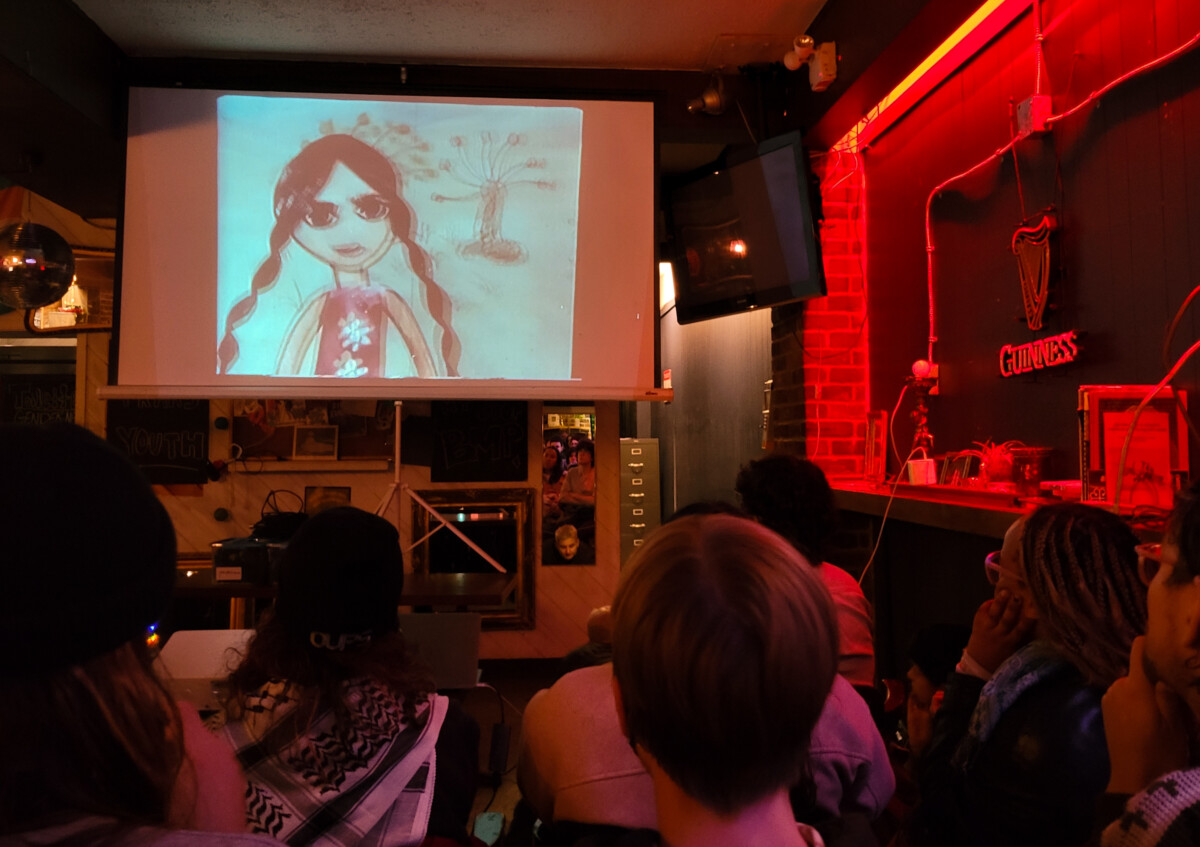Less than a day following Cinéma du Parc’s abrupt cancellation of their film screening event, BMP presented five films by Palestinian women to a full house.
This fall, Bar Milton-Parc (BMP) Co-op has hosted two Palestinian film screening fundraisers for Gaza. Most recently, on Nov. 7, they collaborated with Another Gaze Journal and Another Screen to present a selection of experimental films directed by Palestinian women. The proceeds were divided between Medical Aid for Palestinians (MAP) and local organizational efforts, including mutual aid for a Palestinian refugee living in Montréal who is in need of stable housing. The space was filled with supportive attendees—the venue notably ran out of chairs.
This event was less than 24 hours after Cinéma du Parc’s abrupt and controversial cancellation of their participation in Regards Palestiniens and Hors Champ’s Gaza solidarity fundraiser screening series, From the River to the Sea, which was scheduled to take place on Nov. 6. According to a joint statement from ten cultural organizations in Montréal, the decision was made to cancel the event due to “security concerns” and the “political nature of the screening.”
The joint statement explains: “We learned from our own research that these issues were the result of a petition claiming to represent the Montréal and Canada Jewish Community, falsely accusing the title of the screening series of being antisemitic. We see this deliberate conflation between anti-Zionism and antisemitism everywhere in Canada and in the West in general, and we’re unfazed by it. These false accusations are launched at Palestinian Solidarity events regardless of the content of the event, with the objective of suppressing any expression of solidarity with Palestine.” Read the full joint statement here.
On Nov. 14, Cinéma du Parc issued a statement on their instagram story, stating that “the meaning of the slogan used for the title of the event, From the River to the Sea, varies amongst communities, bringing a sense of insecurity for some, while being a call for liberation to others.” The statement continued; “We were worried for the security of the participants, our clients, and our employees. We would like to apologize for cancelling the event without conferring with the organizers, and for the lack of communication with our public once our decision was made.”
From the River to the Sea fundraiser screenings have continued to be held at other venues. The next few will be held at Cinéma Public on Nov. 28, 29, 30, and Dec. 3.
BMP’s screening event began with Layaly Badr’s 1985 animation The Road to Palestine, which centres the experience of a young girl whose father is killed in an air raid. This heart-wrenching short film imagines a free Palestine through the hopeful eyes of a child living in a refugee camp. This was followed by Larissa Sansour and Søren Lind’s eerie science fiction film In the Future, They Ate from the Finest Porcelain (2015), which speaks to the role of archeology in the construction of national identity.
After a brief intermission, BMP screened Your Father Was Born 100 Years Old, and So Was the Nakba (2018), directed by Razan AlSalah of Concordia University’s communication studies department. This liminal film captures the invisible protagonist’s meanderings through the city of Haifa via Google Street View. Her disembodied voice cries out for a loved one who may have been inside one of the buildings shown in the street view—buildings that no longer exist.
Basma Alsharif’s artful and layered 2009 film We Began by Measuring Distance and Larissa Sansour’s surreal Nation Estate (2013) drew the evening to a close.
The popularity of the event makes it likely that more screenings will be held in the near future. Learn about these films and more by Palestinian women at Another Screen’s website here. Stay tuned for more of Bar Milton-Parc Co-op’s programming on their instagram.
